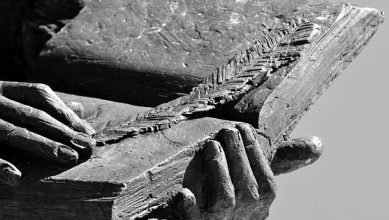It is a fact well established that Jorge Luis Borges’ stories – The Library of Babel, The Garden of Forking Paths to name a few- seldom adhere to the conventional understanding of plot or structure but rather center around one metaphor or concept, usually scientific or metaphysical in nature. ‘The Aleph’, while running along similar themes, primarily explores a fascinating concept- an attempt to explore infinity (or the lack thereof?). At a certain level, The Aleph attempts to dramatize Borges’ belief of the universe being ineffable- and attempting to comprehend the same is a daunting, even impossible task.
The Aleph | Summary
The story begins with the narrator- Borges himself- speaking of the death of a woman he loved, Beatriz Viterbo, who died in 1929. To “devote himself to her memory”, he promises to visit her house every year on her birthday where her father, and first cousin, Carlos Argentino Daneri live. Due to the same, the narrator and Daneri become close to the point that they start asking each other to dinner.
At one such dinner, Daneri is revealed to be a buffoon-like figure pontificating on abstract and convoluted topics such as “the glorification of modern man”. Considering his host a pompous fool, but not willing to offend him, he suggests that Daneri make a record of all his observations for the future. Daneri claims that he has already been doing that, and shows the narrator the epic poem he has been working on for years.
The poem encompasses the entire universe in verse and is simply titled ‘The Earth”. Considering himself a poet par excellence, Daneri reads out a stanza to Borges. The latter finds it uninteresting and exhausting, so much so that he claims that Daneri’s self-praise and the boastfulness of his merits as a poet are far more interesting than the poem itself.
In two weeks, Daneri asks Borges to meet him at Zunino and Zungri’s, a salon. He asks Boages if he can use his influence as a writer to convince the author Alvaro Melian Lafinur to pen an introduction to the cantos that he intends to publish. He also asks if Borges would be kind enough to attach his name to a blurb that had already been written by Daneri praising the greatness of the cantos. While Borges agrees, he decides not to, partly owing to his own laziness but also because Daveri is a self-important buffoon of a man.
Months later, Daneri telephones Borges complaining that Zunino and Zungi’s is expanding, and in the process are planning to break his house down. Daneri later explains that the reason he is 10 concerned is because of the Aleph in his basement, which is “one of the points in space that contains all other points”, a ‘device’ he absolutely needs to compose his poem. The Aleph is “the only place on earth where all places are—seen from every angle, each standing clear, without confusion or blending”, therefore, its loss will mean an end to the poem. Borges, convinced Daneri is a madman, tells him that he will come see the Aleph. Borges also claims that deep down, Daneri and he have always “detested each other”.
Borges is then locked in the cellar where Daneri serves him cognac. Borges worries that Daveri is trying to poison him through the cognac. These fears are dispelled when he finds the Aleph, its size no more than an inch but encompassing all points of time and space, thus holding all of the universe. Borges describes his irritation at the fact that language is sequential and it is impossible to capture the magnificence of the Aleph because one cannot describe all of the universe simultaneously.
Daneri then asks Borges if he saw the Aleph and to spite him alone, Borges eludes the question, asking him to move away from the commotion of the metropolis and advising him to let his house be demolished. Returning to the present, the narrator claims that Daneri’s poem was published and won the Second National Prize for Literature. Borges doubts he ever saw the Aleph in Daneri’s cellar and further claims that literature has had countless other Alephs. He concludes that he is doubtful of all human memory, even the face of Beatriz.
The Aleph | Analysis
Much like Borges’ many other works, The Aleph concerns itself with the nature of infinity and the illusion that is reality. The ‘Aleph’ is the first letter of the Hebrew alphabet and in the Kabbalistic tradition, the spiritual source of all things. Interestingly, since it is the origin of all things it is also the origin of language, itself – yet, it is practically impossible to encompass everything in language.
Themes
The Nature of Memory forms a central theme of the story. Borges claims that human memory is “porous and forgetfulness creeps in”. It elucidates how human memory is capitulated to forgetfulness and something as precious as a beloved face will be forgotten gradually. The Aleph is an ode to the fleeting nature of this very memory that is wiped off by the ravages of time.
The Aleph can be interpreted as an allegory of the drawbacks of the powers of language; while Borges seconds the idea that language can act as a medium to different worlds and ideas, even what gave birth to language cannot be encompassed in language itself. In turn, what we conceive as reality is forever incomprehensible due to this inability to simultaneously inhale all of what there is. The Aleph thus is a classic by Borges that profoundly explores the mysteries of existence.
CHARACTERS
THE NARRATOR
The narrator is a fictionalized version of Borges himself. who, pained by the longing of his beloved, visits her house on her birthday every year. He hates pretentious authors like Daneri. who are filled with praise for themselves, unaware of their own mediocrity. He is spiteful when he refuses to tell Carlos that he saw the Aleph, wanting his house demolished and his sanity questioned.
CARLOS ARGENTINO DANERI
Daneri is introduced as a fatuous man who pontificates his own skills as a poet. The narrator calls his ideas ‘pedantic hodgepodge ‘, implying how exhaustive he is as a man who revels in cliches. Perhaps he is a satirical representation of that brand of literary pretentiousness that Borges found exhausting; however, it is this pretension that brings home awards and laurels, as does Carlos himself.
LITERARY DEVICES
- Symbolism: The Aleph symbolizes infinity and the entire universe. It serves as a nexus for exploring philosophical concepts of all kinds, like the meaning of existence, the nature of reality and how fleeting it can be, and the nature of human memory.
- Allusion: Borges makes multiple allusions to works of literary and cultural importance, especially Dante’s Divine Comedy as well as Hamlet and Leviathan in the epigraphs.
- Paradox: The story employs the paradox of Aleph being the origin of all things, as well as encompassing them, but the sequential nature of language is such that all of the universe cannot be expressed in language simultaneously as it exists.



